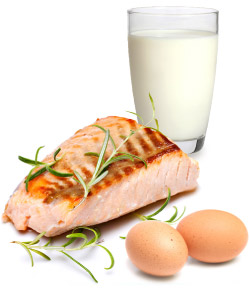Could Vitamin D Offer a Clue in the Battle Against NAFLD?
 It’s no secret that non-alcoholic fatty liver disease (NAFLD) has a dietary component – or at least that a firm link has been established.
It’s no secret that non-alcoholic fatty liver disease (NAFLD) has a dietary component – or at least that a firm link has been established.
Now, based on an intriguing study, researchers are digging deep to uncover what role, if any, vitamin D may have in NAFLD…and whether findings could lead to new and better treatment.
In the fascinating 2013 study, participants diagnosed with NAFLD were studied for vitamin D blood levels. Compared to a control group of healthy subjects, participants with NAFLD were 1.26 times more likely to be vitamin D deficient.
The findings produce a chicken or egg question. Did the NAFLD come first…or did too little D make the participants more likely to fall victim to fatty liver disease? And whatever the cause, how should patients with both NAFLD and D deficiency be treated?
The possibilities are intriguing. But first, what is vitamin D, and why do we need it in our diets?
The “Sunshine” Vitamin
Long known as “the sunshine vitamin” due to sunlight being key to its synthesis in the body, vitamin D actually isn’t a vitamin at all. Rather, it’s a precursor to a hormone.
Unlike many items classified as vitamins, the body can produce its own vitamin D with the introduction of sunlight. In fact, only about 10% of our vitamin D comes from foods. However, some common foods – especially milk products – are fortified with vitamin D for those who have trouble synthesizing and/or utilizing their own. And a whole host of food items are naturally high in D, including vegetables such as broccoli and peppers, meats, fish and nuts.
A Hormonal Link?
Scientists have not yet uncovered the exact correlation between low vitamin D and the development of NAFLD, but theories abound.
It’s possible, for example, that due to its action on hormones within the body, too little D may throw the rest of the body’s hormonal balance off kilter. This is especially relevant as more and more studies are coming out that show a hormonal correlation as regards NAFLD.
On the other hand, hormones that are already out of balance, as may be seen in such issues as Type II diabetes, may themselves be linked to lowered D levels.
Chicken, Egg…or Both?

Image: parentmap.com
Intriguingly, the 2013 study may leave – at least for the time being – more questions than answers. For example, does low D itself contribute to the development of NAFLD in susceptible individuals? Or does NAFLD itself lower D levels? On the other hand, what if some third possibility is causing both issues?
It’s clear that more study is in order regarding this issue, with an aim toward developing better methods of treating NAFLD. In the meantime:
- Get tested regularly by your doctor with full blood and hormonal panels, and ask specifically to be tested for D. A surprising amount of individuals are low in vitamin D and don’t even know it.
- Don’t assume you can’t be D deficient if you live in a sunny area and/or are outside a lot. It’s possible to be low in vitamin D even in sunny areas, for reasons that are not yet clear. It’s possible that some people don’t synthesize D as well as others even with good sun exposure and supplementation, or another factor may be contributing to lowering D or not enabling the body to produce or utilize it.
- Be smart about the sun, but do aim for 20 minutes per day of sun exposure on at least one part of the body. Get your doctor’s go-ahead first (certain individuals should NOT be exposed unprotected to sunshine, including those who have had or are at risk for skin cancer, and certain medications may increase sun sensitivity).
- If you are already D deficient, be aware that a link has been established between this condition and NAFLD. Therefore, no matter what the correlation or cause, you should keep an eye out on your own liver health.
- Eat foods that include vitamin D. Egg yolks, meat, cheeses, broccoli, nuts, avocado, bell peppers and fish are all naturally high in D. Many cereals and some dairy products are supplemented with D (read the labels).
- DON’T assume that because you’re tackling a vitamin D issue (for instance, if you’ve been diagnosed as D deficient and are now taking supplements), your NAFLD will begin to go away by itself. Continue to take steps toward better overall health, a better weight and more exercise, and keep in touch with your doctor for updates and required testing.
